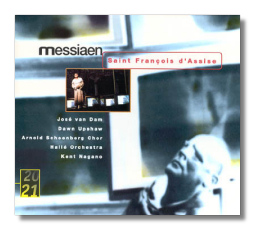
The Internet's Premier Classical Music Source
Related Links
- Messiaen Reviews
- Latest Reviews
- More Reviews
-
By Composer
-
Collections
DVD & Blu-ray
Books
Concert Reviews
Articles/Interviews
Software
Audio
Search Amazon
Recommended Links
Site News
 CD Review
CD Review
Olivier Messiaen

Saint François d'Assise
- Saint François d'Assise (Opera in three acts)
José van Dam (Saint Francis)
Dawn Upshaw (The Angel)
John Aler, Akos Banlaky, Dirk D'Ase, Tom Krause, Urban Malmberg, Guy Renard (Brothers)
Chris Merritt (The Leper)
Hallé Orchestra/Kent Nagano
Deutsche Grammophon 445176-2 DDD 4CDs 66:49, 64:13, 43:09, 60:45
CD may be the perfect medium for getting to know Olivier Messiaen's late masterpiece. (Home video might be even better, as long as the staging is not too distracting.) This definitely is a score to reflect over for a good long time, rather than to swallow in one big gulp, and Deutsche Grammophon's new recording, a release in their 20/21 series, welcomes the necessary reflection. In fact, I wouldn't be surprised if this turned out to be the operatic recording of 1999.
Because of its leisurely dramatic pace, Saint Françoise d'Assise has more in common with a staged oratorio than with an opera. There are dramatic scenes (Saint Francis's interview with the leper, his sermon to the birds), but even these move along at a non-traditional pace. It actually takes a while for this work (or perhaps for the listener) to warm up, but the music has a way of sneaking up on you and grabbing you. Therefore, I recommend listening to the music casually the first and second time through, and not sitting down with the libretto for serious listening until then.
In brief, the opera depicts events in the latter part of the Saint's life. He tells a Brother about the joy of suffering for Christ; he overcomes his repulsion for a leper and heals him with a kiss; he is serenaded by an angel; he preaches to the birds; he receives the stigmata; he dies and receives new life. Saint Francis is on stage much of the time. This is an exhausting role for the singer, and José van Dam announced that the 1998 Salzburg Festival production recorded here would be his last Saint Francis.
The music is a summation of Olivier Messiaen's career. It includes his "modes of limited transposition," an original harmonic language that the composer used for decades, and non-retrogradable rhythms derived, in part, from the Greek and Hindu traditions. Given the opera's subject, it is natural that it is liberally infused with the composer's beloved birdsong. The colors of the ondes Martenot are prominent in many of the scenes.
Once one surrenders to the pace and atmosphere of the opera, one is overwhelmed by its beauty and its power. The sermon to the birds, which occupies the entire third disc, is like nothing else in 20th-century music (except perhaps for other works by Messiaen) - the Saint's accumulating exultation is readily transferred to the listener. In the following scene, the Saint receives the stigmata, and Messiaen's solution to this dramatic challenge is both simple and novel. In spite of its very real challenges to the listener, it is difficult not to have a strong visceral reaction to this music. In this sense, I find it similar to Wagner's Parsifal.
This is the third recording of the opera. The first (no longer available) was released shortly after the work's 1983 première, and there is a live recording from the 1985 Salzburg Festival with Dietrich Fischer-Dieskau in the title role. That one is on three discs, and although I haven't heard it, I assume that it doesn't include the complete score. In any event, I think this new Deutsche Grammophon recording supersedes its predecessors. While not flawless (what project of this scope could be perfect?), its virtues are readily apparent. These include José van Dam's intensely spiritual interpretation of the title role, Dawn Upshaw's radiant Angel, a strong supporting cast, and the expert conducting of Kent Nagano. The recording quality is excellent, and the packaging is attractive. Many photographs of this 1998 Salzburg Festival production are included. They suggest that this production was on the avant-garde side (there is a preponderence of video monitors), but I bet that not even bad-boy director Peter Sellars could distract the listener from the incredible power of this opera and of this performance. Deutsche Grammophon's recording of Saint François d'Assise is a major achievement, and it will pay back spiritual and artistic dividends far in excess of the listener's original investment.
Copyright © 1999, Raymond Tuttle


















